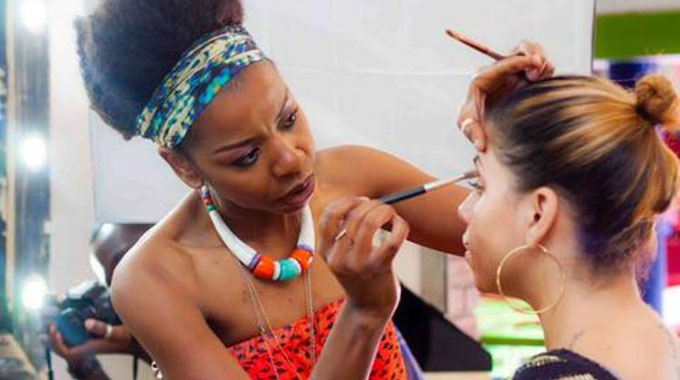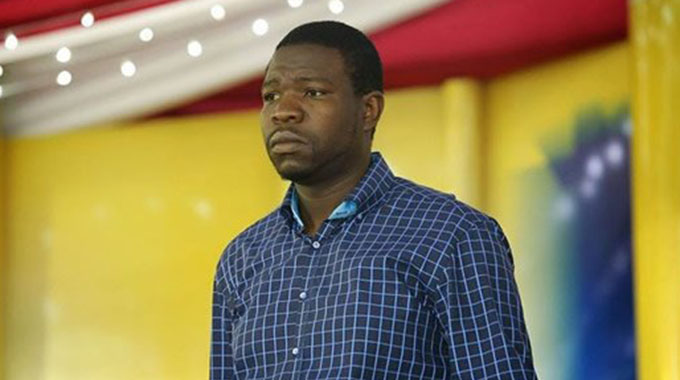Cosmetics trend find new home in Zim

Talent Gore
The cosmetology industry is a multi-billion dollar project thanks to a massive buy in by women who spend lavishly to keep up their appearances. With its roots traced to European countries, most of the products have been made for white women, though black women also feast on the products.
In Africa, brands such as Nigeria’s Zaron and Kenya’s Joanna K Cosmetics are joining the lucrative market, and in Zimbabwe, the last ten years has seen the establishment and growth of a small cosmetics industry run by a new crop of female beauty entrepreneurs.
The make-up range which these women are working on includes foundation cream, face powder, lipstick and 3D fibre mascara, eyelashes, eye shadows and contouring kits.
Gone are the days when only men were considered rich and famous, women are now organizing themselves to create rich lifestyles without support from men, women are coming together to share business ideas and work on money-making ventures.
The hair and beauty industry is the biggest employer of women in Zimbabwe and, in a tight job market, it is increasingly becoming a big employer of men too.
Most of these women have opened up makeup studio and make up bars whereby they train individuals on how to apply make-up and this has been seen as stepping stones for ladies who dream of becoming make-up artists in the future.
Christian by Hadassah is one of these new cosmetics companies.
The company’s manager Hazel Murwisi said their products were fast becoming popular amongst women.
“People have become more open to trying our things especially after seeing how good our products look on our models, or after they see the big socialites that only associate with opulent products using or talking about Christian by Hadassah,” she said.
“The local beauty industry is still small, but this doesn’t mean that there isn’t competition, there is competition because there are other brands that have already been well established, but the pressure that we get from our competitors help us to relentlessly work towards improving our brands.”
Although available in pharmacies and at flea markets, authentic makeup has become increasingly expensive.
Already treated as a luxury good, prices shot up, further impacted by the difference in price in US Dollars and local bond notes. A bottle of Revlon nail polish can now cost as much as $70.
Despite the cost of these international brands, Murwisi said there’s still work to be done to convince customers that local cosmetics are worth the purchase.
“Zimbabweans have a tendency of being condescending local products without at least giving them a try, so it takes a lot of work to convince them to try a product, because they assume that things from overseas are better than local products,” Murwisi said.
Fadzai Mangwiro, the founder of Reelle Cosmetics, said although Reelle’s products are popular, the company still has to attract a customer base that’s used to using international brands.
“You really have to prove your point, you have to go the extra mile to prove that your products are just as good (as international brands),” she said.
Since Jacquie Mgido Cosmetics founder, Jacqueline Mgido, brought Hollywood’s makeup secrets to Zimbabwe, her brand has grown from strength to strength.
Women of colour do not buy makeup. That statement seemed to be the motivation that Jacquie Mgido needed to venture fully into a cosmetics range for women of colour.
At 18, she set off to the US to study, when she stumbled into the segment that had always fascinated her.
Growing up in Zimbabwe, she always felt insecure about her looks and would be fascinated watching her aunts’ transform as they put on makeup.
“I felt that makeup did a thing for women, every time I saw them wearing makeup they came alive. I was so curious as a kid on the transformation that makeup could do to someone, inside and out,” she said.
Curiosity grew and she decided to go to school to study the closest thing there was to makeup artistry, cosmetology. This involved hair and makeup with the bulk of the time spent on doing hair and only a couple of hours left to do what she really enjoyed.
She aspires that women feel comfortable and look beautiful in make-up that makes them all natural and comfortable.
When it comes to Zimbabwe, she visits home more than quite enough to teach ladies or promote and maybe give out some make-overs.
“My vision is to educate, create jobs and spread the Jacquie Mgido brand throughout the whole of Africa,” she said.
Most product lines which were available in the market before only offered one or two colours for the dark-skinned women, but now due to these women in cosmetology there are varieties of dark-skinned make-up shades.
The onset of social media and entry of product lines for colour cosmetics has increased awareness and created demand for the products especially in Africa.
Jacquie Mgido cosmetics changed the make-up landscape in Zimbabwe and this led to the sprouting of several make-up houses as it had proven to be big business.
Another woman who has done so well in the industry is Ruby Lynn, initially she had not intended to go into cosmetic formulation, but Lynn stumbled on this opportunity while preparing make-up tutorials for women.
“I am all about empowering women and the reason I started is I wanted to teach women how to look after themselves and as I was putting together tutorials to post on YouTube I had problems finding products suitable for my skin especially in Australia,” she said
“That’s how I came up with formulating cosmetics, so for me it wasn’t about the money really, it was about my desire to teach women how to look after themselves.
“I was having a make-up workshop, I was also teaching on how women can make their brows, the technique of washing their faces, the different skin types, how to use sunscreen as well as safe ways to bleach.
“We know that women are bleaching and we cannot really make them stop. So we are now telling them how to do it in a safe way,” Lynn who is based in Australia since 2004 said.
Ruby Lynn Artistry has become popular amongst African women because the line has different skin color tone.
“I believe African women are the most beautiful on this planet especially with the different skin types, we have the yellow bone, dark chocolate, medium skin tones — they are beautiful in every colour,” said Lynn.
“And for women who want to pursue such a career I would say the sky is the limit. Never ever be scared to start as long as you are passionate about it. Let us provide products that cater for us because we understand our needs as women of colour.”
The selling point of local brands has been their affordability in comparison to imported cosmetics, but given the price increases, these companies may be forced to increase their prices in order to stay in business.
Neither Christian by Hadassah, Reelle Cosmetics, Jacquie Mgido cosmetics nor Ruby Lynn Artistry locally produce and package their products.
Things are looking good for the small companies, Christian by Hadassah has expanded from providing one product to selling a full range of cosmetics.
Reelle Cosmetics has a distributor in South Africa, with eight products in their line ranging from liquid matte lipsticks to highlighters.
Mbali Makeup and Langa Mineral Makeup have online and physical stores in Harare and Zimbabwean consumers, a vibrant beauty industry is a way to tap into a lucrative global market and also support local entrepreneurs.









Comments